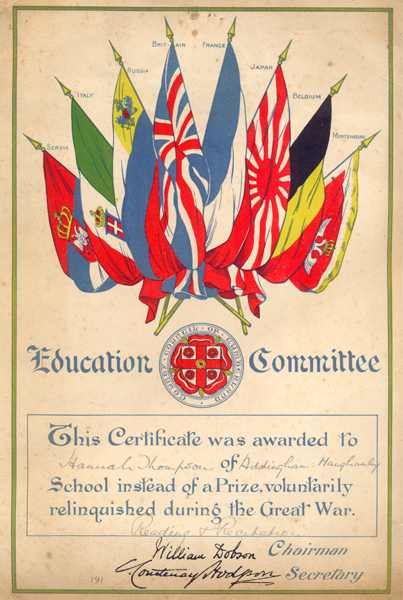Cumberland Council has now replaced the previous Cumbria County Council and 3 District Councils. The content on this website is still relevant including documents that may include the old county council logo. Find out about the council changes
Please update any cumbria.gov.uk browser shortcuts you may have to the new site pages as needed
School life

School Days
Recalling his school days in Carlisle Mr Edwin Towill wrote 'On the whole the great conflict passed without leaving many repercussions noticeable to a small boy' There were of course incidents which stood out. The house opposite his was occupied by Belgian refugees; an innocent artist sketching the Castle from the Scaur was suspected of spying and handed over to the police.
France, Flanders and Gallipoli were far off places. To many school children the war meant the singing of patriotic songs, flags to be waved and collections made for various war charities. On 2nd September 1914 The Great Salkeld School Log recorded 'that the scholars went to see the local recruits [4 of them] leave for Carlisle. The school flag was hoisted.'
There were moments when the war seemed almost real. On November 5th 1915. The log book of Broughton Beck School noted that an airship passed around the hills this morning at 9, so we watched it until it went out of sight over the lake and towards Barrow. Edward Short in his autobiography wrote that the most memorable event of the war years in Warcop was in 1918 when Captain Merry Wynne, son of the local gentry, landed his flying machine in a field near the school.
Many schools welcomed the children of Belgian refugees. On January 25th 1915 the log book of Warwick Bridge School noted that three Belgian children were admitted to Warwick Bridge School this day. The children could speak no English and one wonders how teachers and pupils coped. Ted Short started school in Warcop in 1917. There were sixty-eight children from five to fourteen years of age in two rooms. The headmaster, the only qualified teacher, was away at war in Mesopotamia. There was a succession of supply head teachers. Another teacher was uncertified, which meant she had passed an examination called the Queen's Scholarship. The infants were taught by a 'supplementary' teacher for which status, according to Short, she had two qualifications; she should be eighteen and vaccinated
Schools had to make do as their male teachers were drawn into the forces. On January 15th 1915 Cumberland County Council Education committee reported that 39 of its employees had joined HM Forces; namely 2 Attendance Officers, 5 Head Teachers, 21 Certified Assistant Teachers, 6 Uncertified Teachers and 5 other staff. At Gretna school.
Mr Thomas Blackburn, Head of Gretna School, wrote in the school log book on 7th October 1914'I have been granted a Temporary Commission in the 7th Bat. King's Own Scottish Borderers during the time of the War…..the Gretna School Board have kindly consented to appoint an interim Head Master….I have left 'hints' for future guidance. I leave Gretna today.'
Older children had their part to play in the war effort. It was noted in the school log of 14th October 1914 that six boy scouts from Warwick Bridge School returned full time to school today. Since 11th September the scouts had been given leave of absence by the Education Committee to watch the Eden Bridge at Warwick against possible sabotage, so relieving the hard pressed police. Other children trenched out allotments to increase the food supply. On the 23rd October 1914 The Carlisle Grammar School Volunteer Corps were reported as 'making an impression' on a very stiff bit of land at Saint Aidan's Church'.
The harsh reality of the war was felt in many families when the news of a brother, father or uncle's death plunged the household into mourning. In school the head would announce the death of an ex pupil at assembly. On 24.05.1915 the head at Bishop Goodwin School announced the death on active service of Private William S Curtis who was shot when leading a company of hand grenade throwers.' His name is the first on our scholarship honours board. He is the first of our old boys to die for his country in the 'Great War'. He was modest, gentle, manly and always played the game'.

